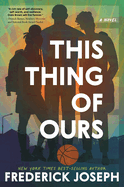
Social justice activist and author Frederick Joseph has published numerous works--essay collections, poems, and a picture book--about being anti-racist, teaching anti-racism, and enabling anti-racist communities. Joseph makes his fiction debut with the powerfully empathic, deeply emboldening young adult novel This Thing of Ours.
Six months ago, Ossie Brown was the nation's third-ranked high school basketball player, headed for the state championships as part of white, wealthy Braxton Academy's team in tony Scarsdale, N.Y. Ossie, from nearby Yonkers, knows exactly why he was recruited and given a full ride by Coach Ryan. In the last three minutes of the game, Braxton is down seven points, and Ossie is getting increasingly frustrated: "These white boys are trying to hurt me, and the refs are either blind or racist, 'cause they haven't been calling anything!" Ossie points out. Coach Ryan retorts, "You know I support most of the Black Lives Matter stuff, Ossie. But not everything is about race." Seconds before what should have been a victory, Ossie is shoved hard into the camera crew and onto "the cold, unforgiving floor." That violence ruins Ossie's knee and ends his basketball dreams, with Syracuse University rescinding his admissions offer; at only 17, he's gone "from the next Lebron to what could have been."
Yet life goes on. It's been "five months and twenty-eight days since the doctors told [him he'd] never play again." He finished junior year remotely to avoid the relentless media, then "spent the entire summer hidden alone in the pages of a story nobody really wanted to read." His girlfriend, Laura, promptly disappeared, having started dating entitled Matthew (a classmate whom they had disliked as a couple) while on vacation. Ossie's teammates--who "claimed to be [his] brothers"--have long gone silent, except for Tommy, the only one still reaching out, although Ossie continues to ghost him. "None of y'all have to worry 'bout making the Black kid feel comfortable anymore," Ossie maintains.
Thoughts of disappointing his late, legendary father plague Ossie, who was "supposed to continue his legacy." Talking to his mother is never easy; she made herself "distant" as Ossie's resemblance to his father grew over the years. It's Grandma Alice who comes to all his games and is his greatest cheerleader. She's equally adamant in her support off the court: "Basketball doesn't define Ossie Brown," she reminds him. She's always urged him to prioritize academics and what she recognizes as Ossie's writing talent; she's unapologetically vocal about "cursing that damn coach and that godforsaken school." With Ossie's senior year looming, Grandma Alice is resolutely candid: "when you walk through those school doors tomorrow, you won't be the six-five basketball star anymore. To everyone there, you'll just be another Black kid," she warns. "But remember... you've been bigger than a ball and rim from the moment you took your first breath."
Without sports, Ossie learns he's quite a talented writer. Boosted by English teacher Ms. Hunt, one of Braxton's few Black teachers, he reluctantly applies to the prestigious Mark Twain Creative Writing Program. His subsequent rejection "nearly breaks [him] in half." Then he overhears a conversation between Ms. Hunt and Dean Blackburn: "It's not just unfair.... It's unethical," Ms. Hunt insists. The truth is that Ossie was unanimously voted in by the selection committee but was nevertheless passed over to allow for less qualified students with legacies and significant family net worth. Quickly realizing Ossie has both seen and understood the situation, Dean Blackburn's damage control is instant: with "a wide, teeth-baring smile," she's the first to congratulate Ossie on his sudden acceptance.
The program is affirming, empowering, and life-changing for Ossie. Other BIPOC students also benefit, such as poet/photographer Luis Martinez, with the type of glowing olive skin that "many Braxton kids spend way too much time in tanning beds trying to get," and "Lauryn Hill kinda brown" will-be journalist Naima Johnson. A first assignment brings the trio together, and despite their socioeconomic divides ("from Yonkers to Scarsdale feels like slipping from one world into another") their shared experiences of being "other," of too often being unheard and unseen, quickly become a foundation from which to build meaningful friendships, and maybe more. When Ms. Hunt's diverse curriculum comes under attack by racist students, shockingly backed by parents and faculty, Ossie knows he can't stay quiet. Defending their teacher and safeguarding her inclusive classroom becomes paramount. In the era of ubiquitous, unforgiving social media, good intentions are not enough. While fighting back against privilege, classism, and ever-present racism, Ossie will also need to figure out how to mend myriad relationships.
Joseph has undoubtedly drawn on his own anti-racist social justice encounters and experiences in creating his main characters: "real life" is woven throughout his fiction, including repetitive microaggressions; race-, class-, gender-based stereotypes; book bans; anti-"woke" attacks; and authoritative parent-led school groups repressing diversity and equity. Difficult conversations are many, and BIPOC readers will likely recognize and appreciate the too familiar scenarios of being overlooked, dismissed, and disrespected. Joseph deftly inserts possible reactions to adapt and emulate in challenging situations--supporting others, speaking out--while also demonstrating what not to do, particularly overstepping boundaries even with the most well-meaning motivations. Non-BIPOC readers, too, might well recognize their actions on the page, whether as antagonists or allies--or both. Joseph carefully crafts a safe space for all readers to reflect, interrogate, and ultimately, (hopefully) to learn to do the right thing. --Terry Hong

